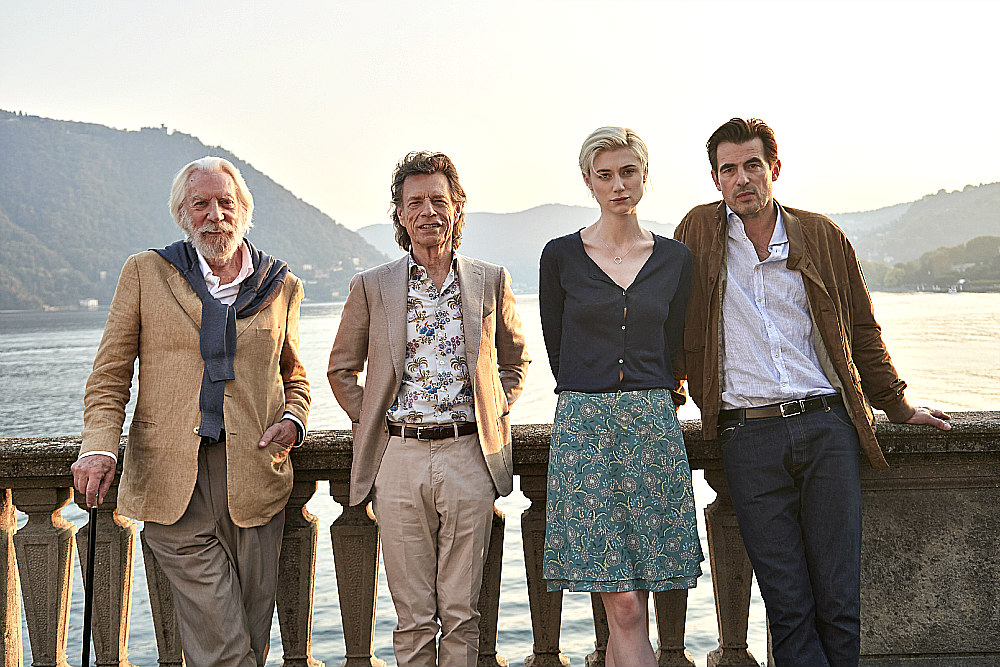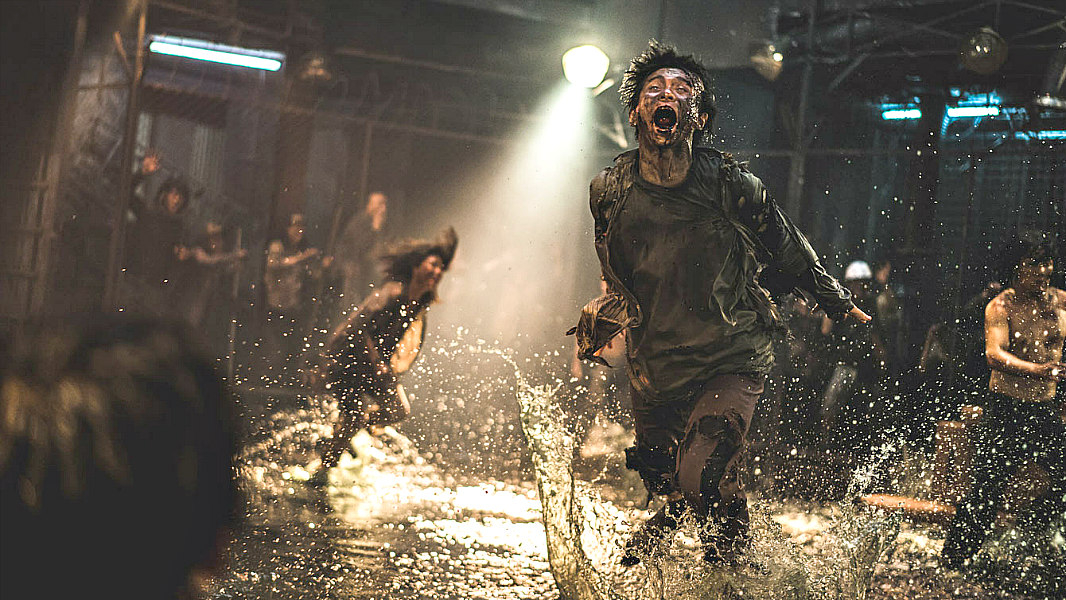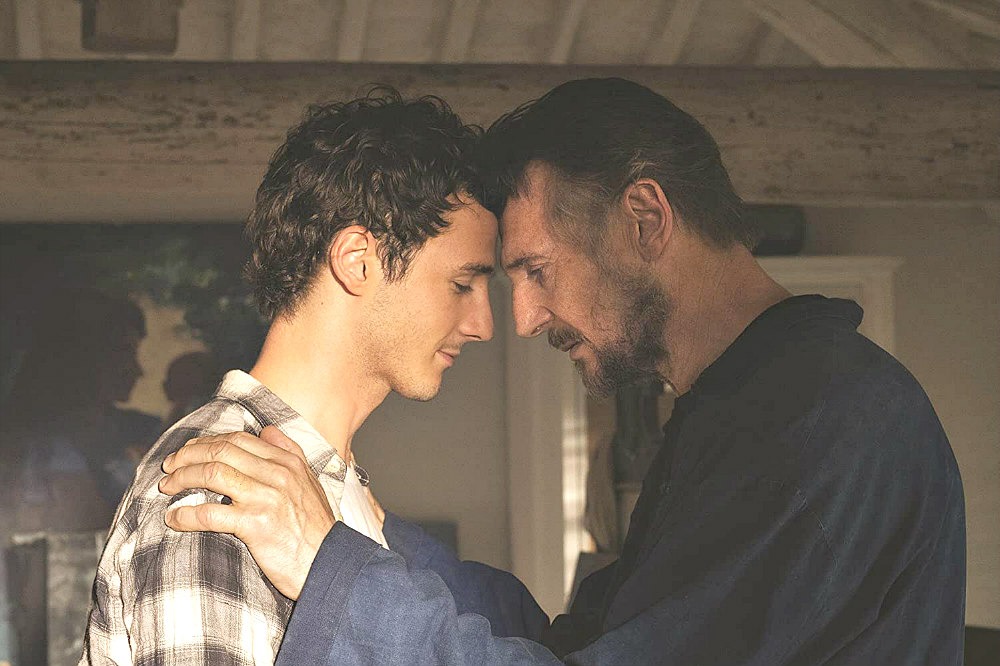Sometimes the new titles bunch up. This week, I’ve written about nine new films, and that’s not even all that became available. But here’s what I’ve got. Some of them are very good.
The Burnt Orange Heresy: 3½ stars
The Secret Garden: 3
Peninsula: 3
Sunless Shadows: 4
Battle Scars: 4
Made In Italy: 2½
I Used to Go Here: 3½
Spinster: 2½
She Dies Tomorrow: 2 ½
THE BURNT ORANGE HERESY: This one was ready to open just as the theatres closed in March. It was bumped again this week, in Vancouver that is. It is playing in New West, Surrey, Victoria, and Whistler; some 29 theatres across Canada. It’s been a long wait all in all, and for Mick Jagger to show us again what he can do as an actor, almost 20 years. You’ll be pleasantly satisfied. He plays a dissolute art collector who lures a devious art critic (Claes Bang) and his slinky girlfriend-of-convenience (Elizabeth Debicki) into a plot. They’re to befriend a reclusive artist (Donald Sutherland) and steal one of his latest paintings. It’ll be worth a fortune, and for the critic, might be a reputation restorative if he can also interview the man who hasn’t been seen in public for decades.

It’s a tightly formatted story from a novel by Charles Willeford, not quite a film noir as it’s transferred from Miami to sunny Lake Como by Italian director Giuseppe Capotondi. But you’ll be drawn in by the machinations, a bit of hot sex and quite a bit of cynicism about the art world. Claes, as an art lecturer for tourists, delivers a cautionary tale about the influence of critics. They’re not to be trusted, he suggests, which can apply to pretty well every character in this film. That makes this tale highly involving, and with an erudite tone and convincing performances by the four leads, an agreeable diversion. (Landmark and other theatres) 3½ out of 5
THE SECRET GARDEN: Four films, as many TV versions, several stage plays and even a Broadway musical attest to the ongoing appeal of this story. I have doubts about how much today’s children will take to it, though. It might take some well-meaning parental prodding to get them there. The story feels quaint by today’s standards, and this version, almost 30 years since the last one, seems more directed at adults than children. Odd, but that’s how it plays out. And fans of the book will find some major changes in aid of improvements that seem elusive.

The 1911 book by Frances Hodgson Burnett has been re-timed to 1947, ostensibly to make it more contemporary for children today. How would they notice that? Characters have been dropped and a fire has been added to boost the drama. There’s now a gothic feel to not very helpful effect except gloomy atmosphere. The story is about friendship and contact with nature helping to overcome grief, which both Mary (Dixie Egerickx) and her uncle (Colin Firth) suffer from. In this version, nature is the more important driver of the two. The garden is exaggerated into a grand landscape with a thick forest. It’s a bit of magic realism that looks beautiful, but feels distant. Mary, meanwhile, is no longer the unpleasant, demanding child of the novel. She’s spirited, but sweet. Very well acted, though, by a newcomer, alongside old pros Firth and Julie Walters, the crabby housekeeper. BBC veteran Marc Munden directed, but writer Jack Thorne and producer Rosie Alison brought on the refocusing. (Telus and other digital platforms) 3 out of 5
PENINSULA: This is a sort of sequel to a film of four years ago from South Korea that elevated a tale of zombies into a cult phenomenon and enjoyed critical approval. Train to Busan has also just been back in a few local theatres, probably in preparation for this one, which is alternately known as Train to Busan presents Peninsula, just so you can’t miss the connection. It would be easy to do that. There’s no train; the characters are new, and the story is only vaguely connected. But it’s a fast, kinetic action picture, the kind that, in normal summers, people flock to. This one is a speedy blast. Michael Bay has nothing on the folks who made it, starting with director and co-writer Sang-ho Yeon.

It’s four years after the zombie outbreak (caused by a virus) that, in the earlier film, sent people escaping from South Korea. An ex-soldier (Gang Dong-won), who made it to Hong Kong, is convinced to go back to find an abandoned truck with millions in American currency aboard. He and three others go in, are joined by a mother, her two street-smart daughters and an old man and are attacked not only by zombies, but by a militia of fed-up army guys. The result is non-stop action, wild driving (some of it by the little girls) in extended chase sequences and low imagining of human nature. The militia runs gladiator games where humans have to fight off zombies. In contrast, our hero has to atone for a shameless lapse on his original escape. All in all, a pretty good time, but with far less social commentary than the predecessor. (Scotiabank and the major suburban Cineplex theatres) 3 out of 5
SUNLESS SHADOWS: This might seem like a dreary, hard-to-watch film. Nothing like that at all. It’s an intriguing, fascinating documentary from inside a women’s prison in Iran that lets the inmates tell their stories. Most of them are about why they killed, or helped to kill, men. Often abusive fathers; or husbands who battered and injured. Director Mehrdad Oskouei, who has documented prisons before, asks the occasional question, but most of the time lets them talk, Sometimes he sets up a video camera that they can speak to directly.

The stories are dramatic and, at times, chilling. Taken together, they give a clear view of society outside. “My mother taught me life was just cooking, cleaning, washing and having children,” says one. Another says her mother impelled her to kill dad and blames her for it. One tells of brothers who demand she get the death penalty, also for killing a dad. The stories are self-serving, sure, but seem accurate. There are some horrible descriptions of domestic violence, depression and no escape, since divorce is not available. One told the police about a beating. “He’s your father,” they said. “You must have done something wrong.” The legal facts aren’t very clear, though. How long a sentence do these women get? One comes back for a visit after serving her time for murder. Still, this is a moving and enlightening film. (Streaming from thecinematheque.ca/films/2020/sunless-shadows) 4 out of 5
BATTLE SCARS: This is the most realistic depiction I’ve ever seen of post-traumatic stress disorder (PTSD). The drama around it is wanting, though. It starts in high school where Vinny (Arturo Castro) announces to his two best friends that he’s been drafted. They’re so close that they all go off to war in Vietnam, doing their duty, they say. Michael (Kit Lang) sees a friend die horribly in an ambush and comes home damaged. He sees the scene repeatedly in dreams and visionary lapses. He’s also shaken because he’s not seen as a hero; people have been protesting the war, and he feels that’s directed at him.

Crummy jobs and heavy drinking only make things worse for him. The visions keep coming. Alcohol can’t numb him. The only outlet is a form of revenge: a friend calls it that, though it’s just a robbery (gold bars from a safe). That doesn’t work out well and there’s more. Drugs and violent sex. Thoughts of suicide. Getting stomped by a bunch of good old boys. The grim events keep building and you really get to understand what’s happening to him. That’s largely because the writer-director, Samuel Gonzalez Jr., knows his stuff. He went to war in Iraq and the central attack he depicts in the movie is very much like one he saw himself. His film is low-budget, but doesn’t look it, and communicates the brute force of PTSD most effectively. (On streaming sites like Apple/iTunes, Amazon VOD and Google Play) 4 out of 5
MADE IN ITALY: A real father and son play father and son here. That adds some emotional heft to this film, but not enough to make it a must. It just feels a bit aloof from us, though the craft and the acting are fine.

Liam Neeson and his son Micheál Richardson travel to Italy to spiff up a house they own. The son wants to buy out his wife’s art gallery in London and needs the money the house will bring when they sell it. Unfortunately, it needs more than spiffing; it’s a neglected mess. As is their relationship. Father and son overcome their strains and bond a bit during their work. A real estate agent (Lindsay Duncan) gives advice, including to get rid of an ugly mural in a large room. The dad painted that while mourning after his wife died, and he wants to keep it. The son, meanwhile, becomes chummy with a vivacious restaurant owner in town (Valeria Bilello). Life can revive, but it takes time. Pleasant enough and smoothly directed by actor James D’Arcy, but hardly imperative viewing. (Langley and Hollywood Theatres in Surrey and Pitt Meadows) 2½ out of 5
I USED TO GO HERE: University students, current and former, will get a kick out of this one. Especially the ones who took creative writing classes, not only for the ambience so accurately portrayed, but also for some of the extra-curricular rumours. It’s a light comedy by director Kris Rey who says he was inspired by his visits to various campuses to show his earlier films. There’s substance here, in several areas, he imagines. And encouragement for a rise back up from setbacks.

Gillian Jacobs plays a newly published author who is invited back to campus by her old professor (Jemaine Clement) to give a reading in his class. Unfortunately, the early sales have been weak, her book tour was cancelled and a New York Times review that comes later is negative. That part alone will resonate with any young writer trying to fight off insecurity and make a mark. What develops out of it is more of a campus comedy as she tangles with a cranky bed-and-breakfast host, is dumped by a fiancé and connects with a bunch of students now living in her old family home. People comment on her book even if they haven’t read it. She connects with a student who praises an old essay she wrote. She finds her old prof has a dark side. She finds strength to brush off humiliating setbacks. We’ve seen it before, but it feels fresh here partly because of an endearing performance by Jacobs and others, and largely because of the funny, slightly absurd, tone. (Available now, digitally and on demand) 3½ out of 5
SPINSTER: The objective is laudable, but not reached. But that’s me. Young women, who this is aimed at, may disagree. They’ll learn not to despair if they don’t have a man. Or, as the main character puts it, “Would you just be terrified that when you’re old and alone, nobody will care about you?” The film starts with that kind of self-pitying and though it improves, doesn’t manage to shake it off entirely. The central character becomes stronger and realizes she can thrive alone, but then a possible resolution seems iffy. Reality? Irony? Maybe just a way to avoid a Hollywood ending?
This one was filmed in Nova Scotia by Canadian director Andrea Dorfman from a script by Jennifer Deyell. Chelsea Peretti, who spent five seasons wisecracking on the TV series Brooklyn Nine-Nine, plays Gaby, age 39, newly dumped and single. She tries computer and speed dating without success (but a few laughs for us), is better at staring than playing softball and spends time with a dog and a niece. Meanwhile, she concentrates on a long-time dream: starting a restaurant. The progression is fine. There are good lines along the way (Aging? "Honestly, it's just living longer. Why is that something to complain about?") but the film is more agenda-driven than it needs to be. (iTunes Canada and Vimeo on Demand ) 2½ out of 5
SHE DIES TOMORROW: I guess this is a cautionary tale about hanging out too much with downers. Their dreary worldview and pessimism can be contagious. Writer-director Amy Seimetz makes the point forcefully, though not at all stridently, by giving us a woman named Amy played by the wonderful Kate Lyn Sheil. She’s convinced she’s going to die the next day. She mopes to repeated choral music in a new house and studies the Internet for cremation urns.
Nobody believes her, but they’re affected. A friend visits, sees Amy almost a basketcase with dread, but, unable to talk her out of it, goes off to spend the evening with a group of friends. When she tells of what she saw with Amy, she starts thinking some of the same thoughts. Those who hear her start thinking do too. And so it goes on, like a virus — kind of topical right now — and also a significant bit of advice: control your negative thoughts, especially about death. Live your life. A relevant, but minor film. (Available now digitally and on demand) 2½ out of 5


Comments